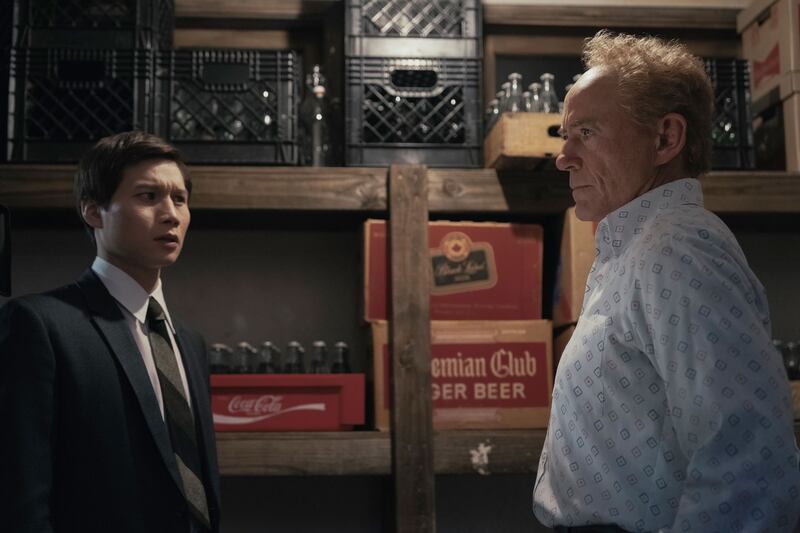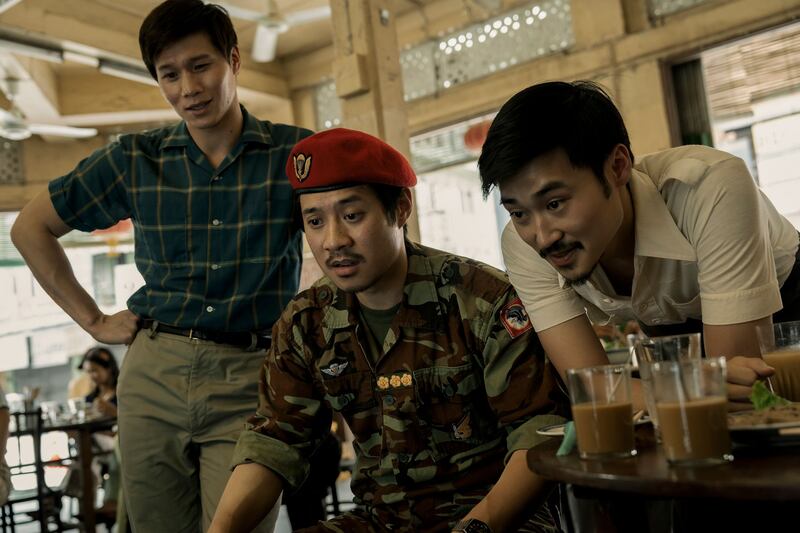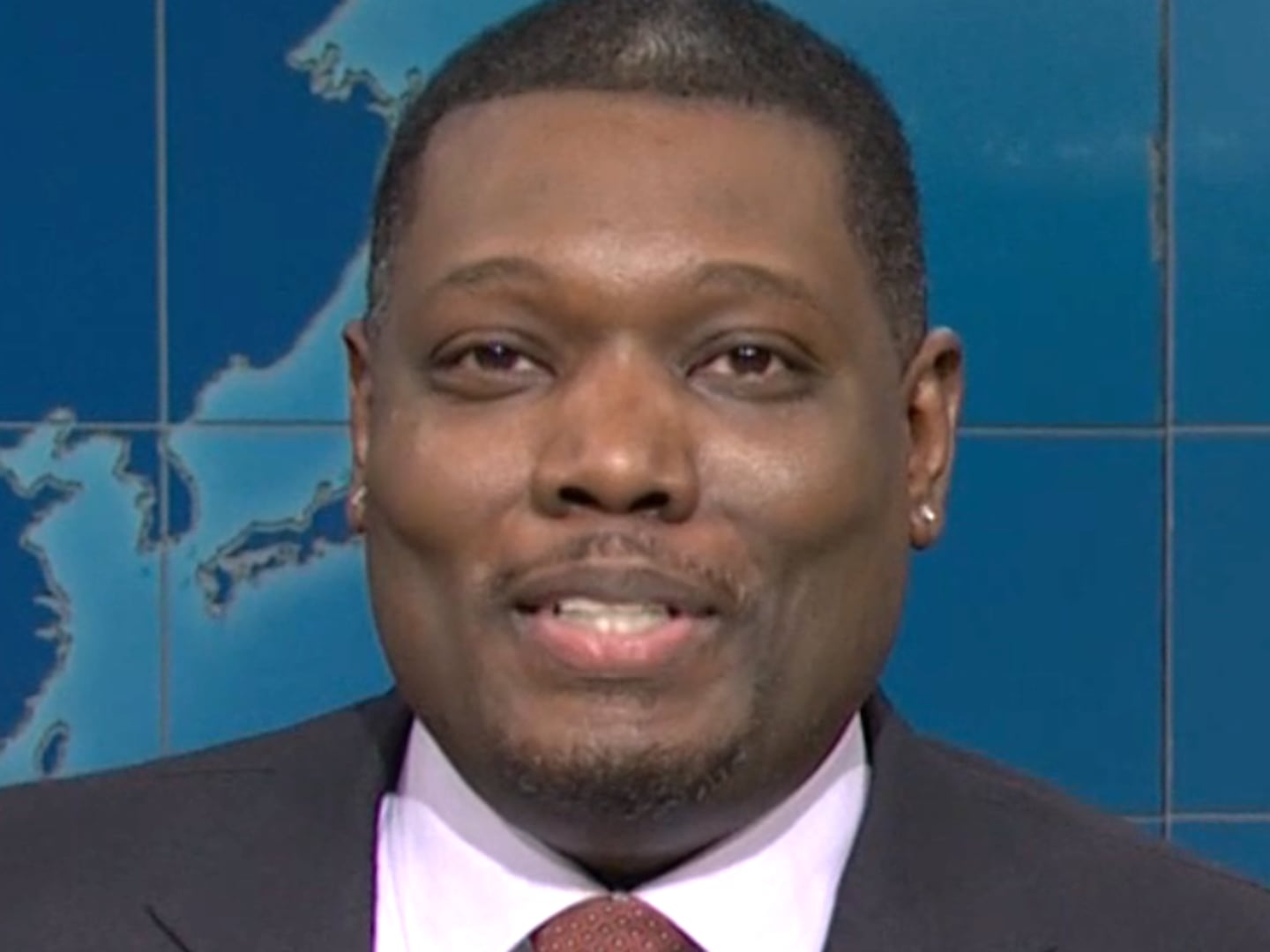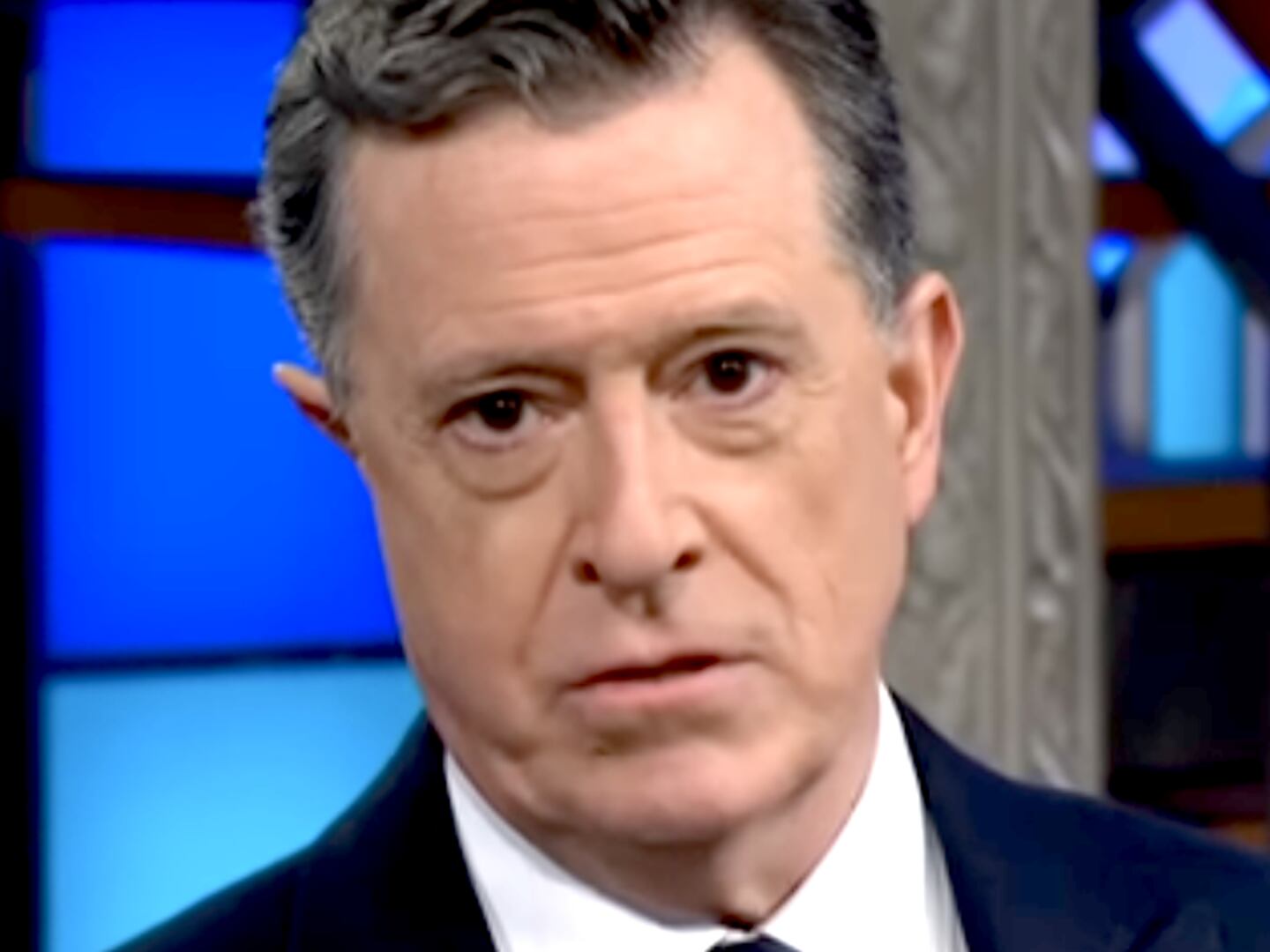The Sympathizer begins in the future. Told almost entirely as a flashback, the first episode of HBO’s new show jumps around from time period to time period with Captain (Hoa Xuande), a mole for North Vietnam working undercover in South Vietnam’s special police forces. “All wars are fought twice,” the opening credits read. “The first time on the battlefield, the second time in memory.”
So into Captain’s memories we go. But before that, we see where he is in the present day of the show: stuck in prison, forced to write the same confession over and over again. He had been a spy, a communist agent installed in South Vietnam, he inks on a piece of paper, his hand worn out from all the writing.
Back in 1975, four months before the fall of Saigon, Captain meets with Claude (Robert Downey, Jr.), a CIA operative working with South Vietnam to take down North Vietnam spies. Little does Claude know that he’s actually working with the enemy—Captain has a great poker face. The pair are going to see a movie (the 1974 version of Death Wish), but it’s all a ruse; inside the theater, the South Vietnam forces plan on torturing a communist woman for information. There, we also meet Captain’s boss, the General (Toan Le), a savage man who giggles while a woman is brutally assaulted on the stage in front of him.

Hoa Xuande and Robert Downey Jr. in The Sympathizer.
Hopper Stone/HBOCaptain gives us a bit of background on his life through narration: He’s half-Vietnamese and half-French, but spent a lot of his young life at a boarding school in America. He’s always felt that his life is wholly incompatible with the world around him, that he’s not accepted in Vietnam—where people tease him for being half-white—nor in the “white” countries, where he gets snide looks from locals. Nevertheless, he’s using these identities to help out his quest in feeding information to the Viet Cong.
We then go back to 48 hours earlier, where we see that same woman apprehended by the special police forces. They’re beating her, torturing her, doing anything to get a special roll of film this woman has just swallowed to hide from the South Vietnamese generals. Captain uses his fingers to pry at her tongue and rip it open, but she manages to bite him, get away, and spit blood in his face. “Hit me, comrade,” she teases, alluding to his traitorous ways. Before the torture at the cinema, the South Vietnamese police drag this woman to another CIA safehouse where they continue to beat her and force her to sit in her own poop.
This all happens just 10 minutes in—and I’m assuming this show is only going to get even more graphic.
Captain really needs to remember why he does this shitty (no pun intended) stuff, so he takes us three days further back into his memories, before this torture stuff started. Captain has lunch with his two best friends, Bon (Fred Nguyen Khan) and Man (Duy Nguyễn), where they celebrate the birth of Bon’s son Duc. Duc says his first word. Is it dad? Is it avocado? Who cares! Everyone’s joyous and lovely.

Hoa Xuande, Fred Nguyen Khan, and Duy Nguyen in The Sympathizer.
Hopper Stone/HBOBut, we learn, Captain isn’t even loyal to his closest friends. Man and Captain are working together against South Vietnam as moles, while Bon is devoted to taking down North Vietnam following the death of his father at the hands of the Viet Cong. Man needs a complete staff list from the police headquarters, so Captain manipulates the General and his secretary into telling him where it is. Captain sneaks a quick pic of the list when the General steps out of his office. Bingo. He mails the roll of film to the address Man requested.
Now, we’re back to the moment before that woman was apprehended and tortured. That roll of film the police are trying to acquire actually came from Captain, which puts the whole “Hit me, comrade” line into perspective. Captain is scraping at the throat of a woman who received that precious cargo from him. Intense. Brutal. I’m hooked. The General asks the woman about who dropped off that roll of film and she gives us another stunning line: “First name ‘Viet,’” she shouts, “last name ‘Nam.’” Then, she really reads the guys all for filth, saying they’ll have hell to pay after this war is over. They laugh in her face.
We then see that, two months later, the same theater that she was tortured in has been bombed. Claude visits the General’s mansion with a peace offering amidst the war: booze and a record for Captain, who is staying at the General’s place. The General needs at least two planes to America to flee—er, “retreat,” he says, from Vietnam with his family and staff, as it’s currently unsafe territory. Captain is used as a (very bad) translator in this conversation, which results in Claude promising two planes, although everyone in the room knows one plane is the most possible.
Cuts need to be made to the list of folks who will make it over to America. In a twist of irony, the General selects Captain to make these cuts, handing over the master list of employees Man sought so intently “like the morning paper.” Captain is clever about this selection: It would be easy to pick a bunch of complete fools, but that would make Captain look like the biggest fool of all. So, Captain cherrypicks members from the General’s team who look able, but are actually unable to support him. Captain himself says he won’t make the journey here. There’s still work to be done.
Captain, however, was able to secure three spots on the plane for Bon, his wife, and their baby. The three buddies share a few beers over lunch, soundtracked by the distant sound of explosions while they hug and kiss each other like true pals. When Bon takes a minute to himself, Captain demands that Man make sure that the girl—remember, the one who the South Vietnam forces cruelly tortured—is safe. This causes a fight about whether or not Captain should drop the spy work and, ultimately, Man recommends that this is the end of the line. “You dream in English,” he tells Captain. “You love America. Admit it.” So, in the end, Captain will take that flight to America.

Hoa Xuande and Robert Downey Jr. in The Sympathizer.
Hopper Stone/HBONow we’re one day before the fall of Saigon. Captain is forcing the General’s daughter to board the bus to another bus to the plane to America, but she wants to go to Paris. No such luck. It’s America or death at this point, and, after some whining, the girl leaves the mansion to head to Paris. Claude is waiting at the tarmac to bid farewell to his allies. The General is curious—what’s Claude going to do to escape this incoming war? “C’mon, we’re the CIA,” Claude smirks, a classic RDJ look. “We’ll figure something out.”
But as the crew is on the second bus to the plane, tragedy strikes: The tarmac is bombed. Everyone is left to race to the plane while dodging incoming explosions. Captain tries his best to shield Bon and his family, but it’s no use—Bon’s wife and baby die while Bon is holding them on the runway. While trying to support his friend, Captain glances at the nearby plane, which is about to take off. Leaving the corpse of his friend’s wife and child behind feels cruel, but Captain needs to get going.
We cut back to prison, where Captain is wasting his days away behind bars. Did he board that plane, and is this the future? Or did he get stuck after the plane took off?






